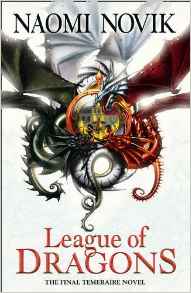League of Dragons brings the Temeraire series to a fitting conclusion. The story picks up right where Blood of Tyrants left off: with Napoleon retreating to the west through the Russian winter. Novik captures the terrible pity of that march, the unrelenting cold of the borderlands, and the folly of men who tried to carry off so much treasure that they skimped on the clothing that survival required. In this volume, Novik finally begins to play around with European history, having air transport of French troops speed the retreat somewhat, and alleviate the deadliness of the river crossings that killed so many soldiers in our timeline. Allied commanders are also anxious to capture Napoleon because they believe that if he escapes, his dragons will transport much of the French army back to areas where they can be supplied and readied for a fresh spring offensive.
As with Blood of Tyrants, I found the section of League of Dragons set in Russia the strongest part of the book. The cold is palpable, the hardships of the men and dragons give meaning to the action, and the supporting cast is full of strong personalities. Again there are echoes of War and Peace, and other Russian literature. All of that adds up to show that Novik can write more than just a cracking good adventure when that is what she wants to do. The amnesia-driven realignment of Laurence’s personality even gets put to dramatic use: he compels a duel with a Russian nobleman. Aviators, in Temeraire’s world, are forbidden duels of honor because in the event of a loss their dragon might also be lost to the Corps. In early 19th century society, they are, for good and for ill, outside the realm of honor that still means so much among Europe’s rulers. Laurence, as a naval officer, was firmly within that realm, and he calls a Russian nobleman out by returning an unforgivable insult before anyone thinks to impress upon him what a bad idea that would be.
The duel is one of the best scenes in the book. The details, the things left unsaid, the competing agendas of the protagonists and seconds, with several different nationalities involved, make for gripping drama. The aftermath is nearly as good, with Temeraire wondering where Laurence has been gone so long, and the increasingly uneasy crew trying to conceal what their captain has been up to from a dragon who knows very well why duelling is forbidden among aviators.
What an audacious book this would have been if Laurence had died! Not that I wish the character ill, particularly, but everyone reading a series like this knows that the main protagonists always get through tight scrapes. What if he hadn’t? It was entirely common in duels, with men throwing their lives away over points of honor. I’m not sure letting Laurence die because of a poorly thought out exchange of insults would have been as remarked on as Ned Stark’s fate in A Game of Thrones, but it would surely have been unusual within the conventions of the genre. The duel itself was well set up, quick, and brutal. I wondered if it hadn’t been brutal enough.
At any rate, the book Novik actually wrote is one in which Laurence is seriously wounded, but survives to return to Temeraire and play a key role in Napoleon’s last campaign. The book draws its title from Napoleon’s great gambit: to offer the dragons of Europe a better place in the continent’s societies than they have hitherto been afforded. Human rulers have used them as weapons of war, as beasts of burden. Napoleon offers them something like sovereignty, with promises of food and integration. Will they cast aside previous allegiances and support him? Will the other crowned heads of Europe see the need for a counterproposal in time? Finally, something very much like a dragon-based nuclear weapon turns up about halfway through the book. How will that affect the balance of power in Europe, or indeed the world?
Novik balances these large themes with the ongoing hazards of a military mission that spans Europe, and the political intrigue inherent in operating at the level where Laurence and Temeraire now find themselves. Temeraire is still a delight to spend time with, and the personalities of the dragons come through more clearly in this book than in previous ones. By the end, the immediate questions have been answered; European history has been re-jiggered a bit, but not entirely. The ending is an interesting mix that left me thinking about where this alternate timeline might go next. The Napoleonic era is over, and with it the saga of Napoleonic battles with dragons.
I also think that Novik has outgrown Temeraire. It was time to write “The end” and move on. In contrast to Patrick O’Brian, she has other worlds to explore as a writer — Uprooted is her first book outside of the series — and I am looking forward to seeing where she goes.

